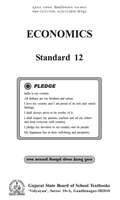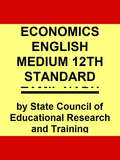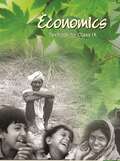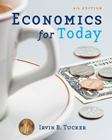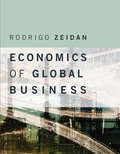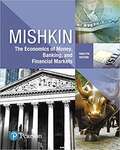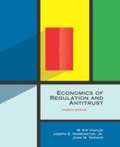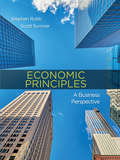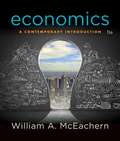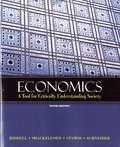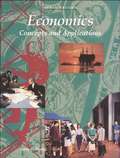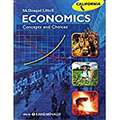- Table View
- List View
Economics class 11 - Tamil Nadu Board - SCERT: பொருளியல் தமிழ்நாடு அரசு மேல்நிலை முதலாம் ஆண்டு
by Government Of Tamil NaduTo acquire a fundamental knowledge on the subject of Economics and to understand its nature and scope; and, To understand the meaning of some of the basic concepts of Economics andto observe how they are applied in the various definitions formulated on thescience of Economics.
Economics class 12 - GSTB
by Gujarat State Board of School TextbooksThe Gujarat State Board of School Textbooks takes pleasure in presenting this textbook to the students. It is prepared according to the new syllabus of Economics for Standard 12. This textbook is written and reviewed by expert teachers and professors. This textbook is published after incorporating the necessary changes suggested by the reviewers.
Economics class 12 - Maharashtra Board
by Maharashtra State Bureau of Textbook Production and Curriculum ResearchThe Maharashtra State Board's Standard 12 Economics curriculum encompasses a comprehensive study of Microeconomics and Macroeconomics. In Microeconomics, students delve into consumer behavior, demand analysis, production theory, market structures like perfect competition, monopoly, oligopoly, and monopolistic competition. They explore the determination of prices and various economic scenarios utilizing demand-supply dynamics. On the other hand, Macroeconomics delves into the broader aspects of the economy, focusing on concepts such as national income accounting, monetary systems, banking, government fiscal policies, inflation, unemployment, and international trade. Students learn to analyze the economy at a national level, understanding factors influencing aggregate demand, supply, and the overall functioning of government policies in shaping economic stability and growth. This curriculum aims to provide a holistic understanding of economic principles, enabling students to comprehend both individual and larger societal economic behaviors and policies.
Economics class 12 - Tamil Nadu Board - SCERT
by ScertTo acquire a fundamental knowledge on the subject of Economics and to understand its nature and scope; and, To understand the meaning of some of the basic concepts of Economics andto observe how
Economics class 9 - NCERT - 23
by National Council of Educational Research and TrainingThe NCERT textbook "Economics Class 9" provides a comprehensive introduction to fundamental economic concepts for students at the ninth-grade level. It covers essential topics such as the basic understanding of the economy, its functions, and the role of various economic agents like households, firms, and the government. The book delves into the principles of production, distribution, and exchange, elucidating key concepts like market equilibrium and consumer behavior. Additionally, it explores the significance of economic development and the challenges faced by economies, offering insights into poverty, unemployment, and inequalities. Through a blend of theoretical explanations, real-life examples, and engaging activities, the textbook aims to foster a deeper understanding of economic principles and their relevance in students' lives, encouraging critical thinking and analytical skills development.
Economics for Today (6th edition)
by Irvin B. TuckerPresents the basics of economic principles and the context to apply them to their everyday lives. The sixth edition continues Tucker's tradition of using a unique textual and visual learning system to concisely present and reinforce core concepts, then assess student comprehension.
Economics in Our Times (Revised Edition)
by Roger A. ArnoldEconomics in Our Times presents a comprehensive exciting relevant and fully integrated economics program for today's high-school student. Five themes recur throughout the Economics in Our Times Program: 1) Economics play a large part in local state national and world events and it is important for the well-educated student to understand this. 2) Economics consists not just of a list of topics (e.g. inflation unemployment monetary and fiscal policy etc.) or even a set of tools; essentially it is a way of thinking students can use to examine critically and understand more fully the world they live in. 3) The student who learns about supply and demand the role of prices opportunity cost costs and benefits externalities the law of diminishing marginal utility and much more that economics has to offer will never again look at the world in the same way;they will have a sharper focus. 4) Economics is presented as a truly social science that not only informs students of facts and issues they will encounter in the business world but also the ideas and issues they will deal with as citizens of the world. 5) Consumer economics should be a part of every student's education. Economics in Our Times takes the position that informed and responsible consumers sellers saver workers and employers don't just happen; they are educated to be who they are.
Economics of Development Course-5 Block 1-4 - Karnataka University
by Karnataka State Open University Mukthagangagothri MysoreThis educational textbook is designed for third-year Bachelor of Arts (BA) students studying in the English medium under the Karnataka State Open University (KSOU), Mukthagangotri, Mysore. It provides a structured and comprehensive approach to the prescribed curriculum, aiming to enhance students’ understanding of key literary concepts, critical analysis, and language skills. The content is tailored to suit open and distance learning methods, supporting independent study while aligning with academic standards and university requirements.
Economics of Global Business
by Rodrigo ZeidanA textbook with innovative real-world macroeconomic analyses of timely policy issues, with case studies and examples from more than fifty countries. This timely and refreshingly real–world focused textbook examines some of the world's most critical policy issues through a macroeconomics lens. After presenting analytical foundations, modeling tools, and theoretical perspectives, Economics of Global Business goes a step further than most other texts, with a practical look at the local and multinational tradeoffs facing economic policymakers in more than fifty countries. Topics range from income equality and the financial crisis to GDP, inflation and unemployment, and, notably, one of the first macroeconomic examinations of climate change. Written by a globetrotting economist who teaches and consults on three continents, Economics of Global Business aims not for definitive answers but rather to provide a better understanding of the context-dependent rationales, constraints, and consequences of economic policy decisions. The book covers long-run and short-run growth (with examples from the United States, China, the European Union, South Korea, Japan, Latin America, Africa, Australia, and Vietnam); financial crises and central banks; monetary and fiscal policies; government budgets; currency regimes; climate change and macroeconomics; income inequality; and globalization. All chapters rely on recent and historical examples of economic policy in action. The book is particularly suitable for use as an introduction to macroeconomics for business students.
Economics of Global Business
by Stern School of BUsinessLearn more about the global economy, and the factors that influence business and government policy.
Economics of Money, Banking and Financial Markets
by Frederic MishkinFor courses in money and banking, or general economics. <P><P> A unified framework for understanding financial markets <P><P> The Economics of Money, Banking and Financial Markets brings a fresh perspective to today’s major questions surrounding financial policy. Influenced by his term as Governor of the Federal Reserve, Frederic Mishkin offers students a unique viewpoint and informed insight into the monetary policy process, the regulation and supervision of the financial system, and the internationalization of financial markets. The 12th Edition provides a unifying, analytic framework for learning that fits a wide variety of syllabi. Core economic principles and real-world examples organize students' thinking and keeps them motivated.
Economics of Regulation and Antitrust (4th edition)
by W. Kip Viscusi Joseph E. Harrington John M. VernonThis new edition of the leading text on business and government focuses on the insights economic reasoning can provide in analyzing regulatory and antitrust issues. Departing from the traditional emphasis on institutions, Economics of Regulation and Antitrust tasks how economic theory and empirical analysis can illuminate the character of market operation and the role for government action and brings new developments in theory and empirical methodology to bear on these questions. The fourth edition has been substantially revised and updated throughout, with new material added and extended discussion of many topics. Part I, on antitrust, has been given a major revision to reflect advances in economic theory and recent antitrust cases, including the case against Microsoft and the Supreme Court's Kodak decision. Part II, on economic regulation, updates its treatment of the restructuring and deregulation of the telecommunications and electric power industries, and includes an analysis of what went wrong in the California energy market in 2000 and 2001. Part III, on social regulation, now includes increased discussion of risk-risk analysis and extensive changes to its discussion of environmental regulation. The many case studies included provide students not only pertinent insights for today but also the economic tools to analyze the implications of regulations and antitrust policies in the future. The book is suitable for use in a wide range of courses in business, law, and public policy, for undergraduates as well at the graduate level. The structure of the book allows instructors to combine the chapters in various ways according to their needs. Presentation of more advanced material is self-contained. Each chapter concludes with questions and problems.
Economics with Emphasis on the Free Enterprise System
by Joan S. Ryan Irvin B. TuckerNIMAC-sourced textbook
Economics, Reading Study Guide: Reading Study Guide
by Houghton Mifflin Harcourt StaffNIMAC-sourced textbook
Economics: A Business Perspective (Surveys In Economics)
by Rubb SumnerEconomic Principles: A Business Perspective leverages student fascination with business by drawing clear connections between fundamental economic theory and the business decisions that students—whether they are future CEOs, small business owners, managers, or independent workers—will make in their careers.
Economics: A Contemporary Introduction
by William A. McEachernEconomics has a short history but a long past. As a distinct discipline, economics has been around for only a few hundred years, yet civilizations have confronted the economic problem of scarce resources and unlimited wants for millennia. Economics, the discipline, may be centuries old, but it’s new every day, with fresh evidence that refines and extends economic theory. In this edition, the author draws on more than three decades of teaching and research to convey the vitality, timeliness, and relevance of economics.
Economics: A Tool for Critically Understanding Society
by Tom Riddell Jean A. Shackelford Stephen C. Stamos Geoffrey SchneiderThe authors take a historical perspective, presenting economic theories and their connections to a wide variety of schools of thought.
Economics: Concepts and Applications
by Larry D. HodgeThe book speaks about all parts of the economy especially the kind of U.S. economy and other economies in other nations, the role of money and banking, the dependence of U.S. economy on other nations, trade and how nations decide what to trade.
Economics: Concepts and Choices NCEE Student Activities
by Mcdougal-Littell Publishing StaffNIMAC-sourced textbook
Economics: Concepts and Choices Test Practice and Review Workbook
by Mcdougal-Littell Publishing StaffNIMAC-sourced textbook
Economics: Guide To The Essentials Teacher's Manual (Economics: Principles In Action, 2003)
by Arthur O'Sullivan Steven M. SheffrinNIMAC-sourced textbook
Economics: Institutions and Analysis Fourth Edition
by Gerson Antell Walter HarrisThis text book keeps it simple. It's organized intelligently and it has an extended glossary with concise definitions of virtually every term mentioned in the text. So while economics is never easy to grasp, this book is written in such a straight-forward way, it makes it clearer than most economics text books.
Economics: Michigan Edition Grades 9-12
by Arthur O'Sullivan Steven M. SheffrinThe System includes: Higher-level content that gives support to access complex text, acquire core content knowledge, and tackle rigorous questions. Inquiry-focused Projects, Civic Discussions, and Document Analysis activities that develop content and skills mastery in preparation for real-world challenges; Digital content on Pearson Realize that is dynamic, flexible, and uses the power of technology to bring social studies to life. The program uses essential questions and stories to increase long-term understanding and retention of learning.

